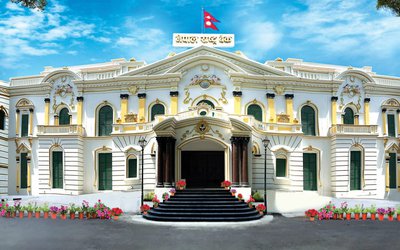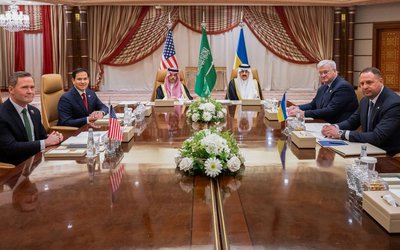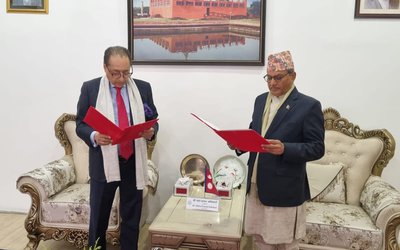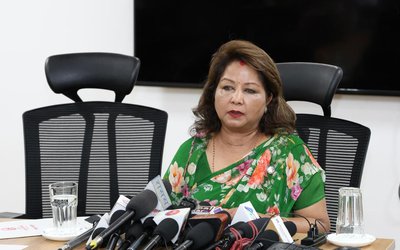
Since he was promoted as the Chief Secretary, Dr. Som Lal Subedi has made many changes in the civil service to improve its service delivery. As an expert on Fiscal Decentralization, chief secretary Dr. Subedi is now preparing a document to fit civil service with the Federal Structure as propounded by the constitution. Excerpts from Dr. Subedi's views:
As the country has already moved to federalism following the proclamation of the new constitution, what steps is the Prime Minister’s Office taking?
One of the important parts in the process of implementation of federalism is the roadmap of the state for three tiers of government. As per the election of local bodies and design of provinces, we need to change the bureaucratic set up and institutional design. Despite all this, we have already taken certain decisions as per the blanket provisions of the new constitution.
What is the PMO doing now?
We have already started to work on how to fit in our civil service with the current provisions of the constitution. Although the federalism has finally become part of Nepal’s political system following a decade of debates and discussions, the challenge now is how to implement the political vision and translate it into reality. Politically, Nepal is a federal state now but there is the need to give high priority to administration. The administrative setup has got little preference. Even those who claim to be federalism experts have given only a little priority for administrative preparations. Realizing the importance of administrative reforms, I took the initiative right after the promulgation of the new constitution by the Constituent Assembly.
What role have you been playing as the chief secretary?
I have directed secretaries of all ministries to prepare the administrative designs for the federal structure, focusing on five sectors. Some ministries have already presented their tentative working plans. As the new constitution has proposed three tiers of work on concurrent lists, the government agencies which have been working in such system under previous unitary system have to design as per the three tier system of constitution and fit in their scope and authority. As per the expenditure assignments, we have to restructure the system on the basis of existing human resources, fiscal resources and institutional growth. We need to do detailed analysis for the adjustments of the system.
How long has the PMO office been taking the initiative for administrative restructuring for federalism?
When I was the secretary at the Prime Minister’s Office four years back, I developed the terms of reference. As per the terms of reference, the government established administrative restructuring unit at PMO office and units at various other ministries. We also held a workshop on how to make the restructuring technical units. Following the workshop, different ministries set up such units. Four years ago, PMO also directed these units to come out with the legal needs and fiscal resources for the federal forms of government.
What is their state now?
Following the promulgation of new constitution, there is the need to make many acts and readjustments of old acts and designs. For this transitional period, the previous committee also included the account and legal divisions. It was also directed that the committee should report to Ministry of General Administration every fifteen days about the progress. PMO has also received some progress report. My third direction is to prepare a primary list for adjusting and readjusting the laws and acts as per the new constitution. I have also directed the secretary to lead such committees. If each ministry can do it, it will save time and produce results in time. Concerned ministries are the experts of their own needs.
What is the PMO specifically doing now?
I have also directed concerned secretaries to collect and list the information on property, human and financial resources existing in the provinces. As the constitution has already formed seven provinces, I have directed it to prepare the profile of each province with clear indicators. If we develop profiles with indicators, these will help collect the information on public property, assets, resources and public lands for constitution. Once the headquarter of the province is decided politically, we will be in a position to show the physical assets of the particular province. It will help to plan for the future consultation and development of province.
What were the other instructions?
I have also directed that, from now on, there will not be any positions created and restructuring of the administrative units and adjustments made against the federal provision of the constitution. Creation of new positions and units will increase load to the provinces. Despite saying this, we cannot stop adding the positions so far as improving and providing services to the people and reaching to the people are concerned. Whatever the system there may be, there is always the need for the institution to provide the service. Whatever the system can be made, there is need to have institutions for the improvement of service and betterment of delivery system.
What about the secretaries meeting?
The secretaries meeting endorsed this direction and owned it. We are in the process of Three Pillars Reform program. We are now making a reform working plan, including all the necessary elements. After finalization, we can go for the implementation. Once again the question is civil servants have to work under the elected representatives. The role of civil servants is to implement the policies formulated by the elected representatives.
What is essential to make federalism functional?
Political ownership, vision and initiative are important in the implementation of federalism. Politically conducive environment for the employees to implement the program is also necessary. As there are no elected representatives now in provinces and local level, political vision and ownership are very important in the implementation of federalism. Politicians have to create conducive environment at all the levels. Until we can develop a system to work together with administration and politicians, it is impossible to make federalism functional. If they work together, the transition from unitary to federal setup will be shorter and effective.
What are the challenges?
There is the need to take two things side by side. First, there is the need to prepare a working plan to fulfill the requirements as demanded by the constitution for federalism. This includes management of human resources, institutions and financial resources to deliver effective services to the people. And, there is the need to take the basic services and quality assurance side by side.
What does your experience say?
Going by our culture, what I believe, is our political culture focuses on distributive justice rather than economic growth, increasing production and use of production capacity to enhance production to provide social justice. Instead of thinking about how to achieve economic growth, employment generation and increased production, we are spending our resources in the wrong sector. We have already established rights, but we have failed to fulfill our responsibility to use the resources for the overall development. Even the political entrepreneurs need to work hard to create a just society. Even in federal structure, we need to impose hard budgets.
Do you think federalism will function easily?
If we are unable to rationalize the political and administrative costs at the provinces level, people are unlikely to get the basic services and this will generate a wrong message. The wrong message will be a federalism turned into another unitary form. From now on, we will need to talk about political transparency, financial discipline and making political entrepreneurship and growth justifiable for distribution, aware that all the services are likely to concentrate around the provincial headquarters. If our design of provinces does not inject such things, it will create more troubles.
What do people require?
There is the need to design a system to deliver things for the people. If we devolve more power at the grass roots level, it will empower the people. In case we fail to devolve power, it will give a wrong message. We have to initiate steps to make the system transparent. If the budget allocated to improve the basic services is spent for administrative and political management, it is likely to affect the service delivery. It will create a negative publicity.
What do you suggest for making provinces functional?
We need to design the provinces by making them competent to provide effective services to the people. If we are unable to devolve more power than the present Local Self Governance Act provisions, the power will be centralized more than decentralized. When we design devolution, we need to look at this aspect. There is the need to be guarantee effective services and balanced development. Instead of following the old paradigm that the center should be the giver and provinces and local bodies should be the receivers, there is the need to follow the approach to provide them with authority as per their capability.
How can we strike the balance?
Political mindset, administrative capability, social capability, assimilation of rights and duties are factors needed to strike the balance. No state can give rights without fulfilling duties. Even social contract theories have highlighted the rights and duties side by side. Social will is a collective interest. It is equal. It is individual as well as collective. Our politicians need to be more watchful. They should guide us. We want to see their vision in administration. Even after the promulgation of new constitution, politicians have yet to show their vision and modality for the provinces. Since we are still in the transitional stage, the political stage is yet to be set.
It seems that there is still this calculation going on between the losers and gainers. Whatever the debate may be, it should be driven fairly and freely. If there is the lack free and fair election, it will be very difficult for federalism to survive. Who will speak on behalf of the people? There is a very difficult process to transfer the mandate of people through administrative measures. Since there has been no election for almost 15 years, the local bodies are under the administrative functions. The role of administration is to drive the political will. On my own neutral observation, what I can say is federalism is a political will -- credibility, bureaucratic commitment and competencies are important.
After assuming the position of chief secretary, you have implemented some important decisions , including the Mathema Commisison’s report. An equally important step was the introduction of performance contract. How do you look at your own work now?
So far as the report of Mathema Commission is concerned, we have already directed the concerned to implement all the recommendations. One recommendation regarding affiliation is now under the study of National Planning Commission. Once the NPC gives its report, we will implement it. We have already implemented the controversial and debated issues like fixing fees, quotas and so on. We have already gone to action. We need cooperation from all stakeholders to implement other recommendations.
Do you think Mathema Commission report points out all shortcomings?
Mathema Commission report has certain shortcomings, too. The report failed to address the issue of code of conduct of doctors and paramedical workers. The report failed to bring what the people expected from it. How many patients a doctor can check up and how many colleges a doctor can be allowed to teach? How to make the doctors on government scholarship accountable? There is the need to increase the social motive of doctors. There are certain lapses. There is the need to guarantee the quality of service.
How do you explain the performance contract?
The performance contract is the best way to make the service delivery effective. However, there also is the need of political commitment. A politician must say that he cannot violate the agreement. If the results are not out, it is very difficult to separate the administration from politics. We need a political support to make it more effective. Why not transfer in five years or ten years? What should be the motto of federalism?
The motto of federalism and any governance reforms should be broadly guided by my country, my pride, my duties and my rights, especially in the Nepalese context.
- ADB’S CHIEF ECONOMIST: Nepal Reduces Poverty
- Mar 11, 2025
- FM DR. DEUBA: A Successful Visit
- Mar 11, 2025
- MD GHISING: Target Of Personal Grudge
- Mar 09, 2025
- UPPER TRISHULI-1 HYDROPOWER: Supporting Community Development
- Feb 24, 2025
- ADB POWERING NEPAL: Five Decades Of Support
- Feb 24, 2025















